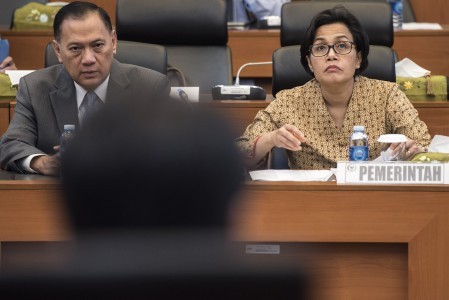Popular Reads
Top Results
Can't find what you're looking for?
View all search resultsPopular Reads
Top Results
Can't find what you're looking for?
View all search resultsIndonesia rate slasher seen as safe choice to stay as chief
Change text size
Gift Premium Articles
to Anyone
Indonesia central bank watchers know precisely what they want from its next governor: stability.
With three months to go before Agus Martowardojo’s term ends, there’s still no word from President Joko "Jokowi" Widodo on whether he’ll nominate the governor for a second run. Whoever lands the job, economists want someone who’ll continue Martowardojo’s reforms: they’ve helped cool inflation, tame currency volatility and earned the central bank credibility with investors and credit rating firms.
“Under his watch, monetary policy credibility has been strengthened further,” said Euben Paracuelles, senior economist for Southeast Asia at Nomura Holdings Inc. in Singapore. “Amid all the reforms and policy changes, there has been a great deal of transparency, which is critical from a central bank communication standpoint,” he said, with Bank Indonesia now “in a strong position to address risks, particularly from external factors.”
After eight rate cuts since 2016 and inflation at a one-year low, Martowardojo’s track record gives him a good chance of nomination, said six economists contacted by Bloomberg. If he does get a second term, it will be the first time in 40 years that a central bank chief is reappointed.
Economists say that other possible candidates include former finance ministers Chatib Basri and Bambang Brodjonegoro, now planning minister, along with the central bank’s Senior Deputy Governor Mirza Adityaswara. Another option is Deputy Governor Perry Warjiyo, whose term ends in April, and who will be replaced by one of the three candidates already nominated by Jokowi for the deputy position.
Jokowi said he hasn’t received any recommendations for the governor’s job.
“It should be someone who can gain the market’s confidence on economic issues, including monetary policy and inflation,” Jokowi said at an event in Depok, West Java, according to a statement from the cabinet secretariat on Friday. “I believe the trust of the public and the market is very necessary for a governor of the central bank.”
Elsewhere, central banks are also in flux. Jerome Powell takes over from US Federal Reserve chair Janet Yellen, Bank of Japan Governor Haruhiko Kuroda is waiting to learn if he will be appointed to another term, while China, South Korea and New Zealand are also bracing for change.
Martowardojo, 62, became head of the central bank in May 2013 after serving as finance minister for three years. As his five-year term winds down, his approach to managing inflation and the currency looks anything but timid.
Within a month of taking over the monetary policy levers, the former banker led his board to unexpectedly hike rates as the ‘taper tantrum’ prompted an exodus of capital from emerging markets. Bank Indonesia later embarked on an aggressive easing cycle at the start of 2016 in a bid to fire up Southeast Asia’s largest economy. Growth remains stuck at about 5 percent, while bank lending has been lackluster.
Annual inflation, which soared above 8 percent just three months after Martowardojo took office, eased to 3.25 percent in January, according to data released on Thursday. The currency is also more stable, having weathered three U.S. rate hikes last year.
Choppy Waters
Whoever the parliament approves from Jokowi’s shortlist will be taking the reins as central banks elsewhere start withdrawing stimulus. The Federal Reserve is penciling in another three hikes for 2018, creating fresh risks for emerging markets. And with a presidential election for Indonesia likely next year, another stint for Martowardojo would underscore a desire for stability.
“We believe that if there is a transition, the transition will be carried out smoothly and that the financial system stability, macroeconomic stability and all of Bank Indonesia’s policy mix will remain consistent,” Martowardojo told reporters last week. He declined to say whether he wants a second term.
Jokowi is expected to submit his picks for governor within weeks. The parliament is required to conduct a fit-and-proper test and approve any appointment at least one month before the incumbent’s term ends.
“Agus has been quite good at maintaining low inflation and a stable rupiah and for me, he deserves another term,” said David Sumual, chief economist at PT Bank Central Asia in Jakarta. “But this is a political decision, and it’s very rare. Usually, if the regime changes, the governor also changes.”










